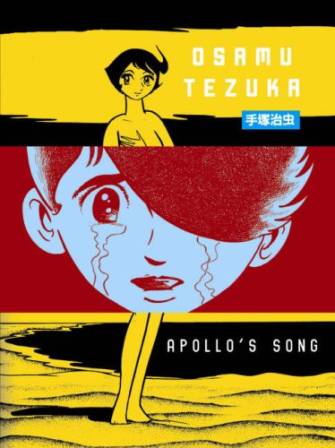
July 12, 2007
 CR Review: Apollo’s Song
CR Review: Apollo’s Song

 Creator:
Creator: Osamu Tezuka
Publishing Information: Vertical, softcover, 544 pages, July 2007, $19.95
Ordering Numbers: 1932234667 (ISBN10), 9781932234664 (ISBN13)
The scene I like best in
Apollo's Song is a throwaway sequence in one of the book's unstuck in time moments, when our "hero" Shogo Chikaishi finds himself in the role of a future human assassin plotting against a more-than-human, synthetic queen of Japan. He finds out through a conveniently-placed guide that most of humanity went extinct due to atmospheric pollution. However, instead of dryly providing that information in the course of a conversation, which certainly would have worked, master storyteller Osamu Tezuka has Shogo confront a previously busy city district and a ballpark now covered in gravestones. The tokens of the dead overwhelming the common space of the once-bustling living haunts far more effectively than you might think; you can almost feel the hard stone of the markers interfering with the basic function of movement and motion that previously defined those thriving places.
 Apollo's Song
Apollo's Song tends towards grand, deliciously cartoony statements like this. In fact, the book starts out with a scene of thousands of naked men in a full sprint towards one woman as representative of sperm fertilizing an egg. There are other equally florid moments. An animal eats her young to protect them, a woman beats her child in a slinky negligee, the bombing of a concentration camp transport train concludes in a nature scene with trees made into logs littering the foreground, a robot hugs its master to death... The show-stopper is in one of the book's initial extended metaphorical reveries/fantasies/leaps in time, where Shogo discovers a secret animal sex grove on an Eden-like island. And while it's tempting to pick up this massive graphic novel and love it like a new parent loves their child for simply being the kind of book that offers as an important plot point a secret animal sex grove, I would downgrade
Apollo's Song from the potent genre stew and periodic looking to the heavens that was Vertical's last Tezuka project,
Ode to Kirihito. If that book was like a Sam Fuller film that cuffed and yanked the reader from moment to moment with superior displays of craft, this is more like some super-odd home movie touched by genius that no one really wants to talk about over coffee afterwards.
I've read that this manga, serialized over the course of 1970, comes from a period where sexual content suddenly became a part of the toolset for comics creators, one imagines as part of the overall cultural revolution that hit Japan just like it did most other countries starting in the late 1960s. Shogo Chikaishi is a young man with an unfortunate tendency to stomp on animals for their suggestions of caring and intimacy, a proclivity that left unchecked authorities believe will flower into severe adult misbehavior. He undergoes two courses of therapy: his modern-day doctor pursues an aggressive line of electroshock therapy that eventually drives him into running away and hiding out with a woman who trains him as a marathon runner but is actually a student of his doctor interested in getting at the roots of his problem, his inability to love. Meanwhile, a supernatural representation of love has cast him into a time-traveling or past lives/future lives odyssey where he falls in love with a person and loses that person, over and over again. The clever twist to the narrative is that the present-day narrative begins to conform to the pattern of the outlandish tableaux, and in fact we find that they're one and the same. The ending, with its certainty that Shogo's ordeal will continue, almost feels like the end of a TV pilot.
Where I don't think that the manga is as strong as some of Tezuka's other work is in the assumptions the author makes going in. On the one hand, Tezuka's certainty as to how the universe works give us wonderfully potent and assured epiphanies. On the other, these moments begin to feel as if they're oversimplifications of the life conditions they deign to explore. Great cartooning can't all by itself hammer something as complex as sex into the round hole represented by love through male/female intimacy, as the world view of
Apollo's Song repeatedly suggests. That these impulses and emotions are reflected in the natural world feels kind of like a cheat because they're given expression through Tezuka's eerie, human-like animals. A lot of the more abstract ideas, such as the synthetic humans versus real humans comparisons, feel like metaphors selected to match a pre-existing assumption about meaning. There's no sense of exploration, no conception that these scenes are doing anything other than proving in heavy-handed fashion what Tezuka knows coming in.
This is exacerbated by an ending that comes fulls circle, a narrative choice that seems to willfully ignore any progress maintained or lessons learned in the 500 pages that come previous to it. That may be Tezuka's greater point, and there's something to be said about seeing this as less a book about the nature of love and more about how any exploration of love can be frustrated by an increasingly cold and modern world. In the end, I'm not sure he's earned the sweeping statement no matter how he wants to phrase it. When its heart reveals itself,
Apollo's Song proves a bit more lecture than dialog, a ride around a cul-de-sac rather than a journey down a road. Even when it takes the form of masterfully evocative comics, I'm not sure anyone how much anyone wants to hear one man's sermon, on love or anything else.
 posted 1:00 pm PST
posted 1:00 pm PST |
Permalink
Daily Blog Archives
November 2019
October 2019
September 2019
August 2019
July 2019
Full Archives


